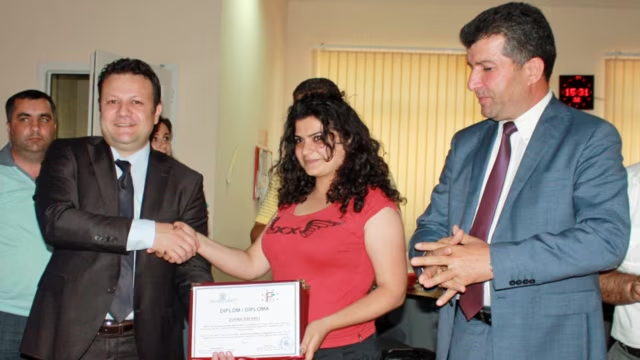Human Trafficking Exposé Earns Honors for Radio Azadliq Reporter
A Radio Azadliq investigative report on the trafficking of Chinese laborers in Azerbaijan earned top honors from the Azeri government and several NGOs.

A Radio Azadliq investigative report on the trafficking of Chinese laborers in Azerbaijan earned top honors from the Azeri government and several NGOs at the culmination of a month-long campaign to boost awareness of human trafficking.
Durna Safarli’s exposé uncovered the mistreatment of Chinese migrant workers at a hydroelectric plant in the western city of Mingachevir, and was recognized on June 6 at a ceremony in Baku as 2011’s “Best Article on Human Trafficking.” The event was sponsored by the Azerbaijan Ministry of Internal Affairs, the OSCE Office in Baku, the International Organization for Migration, and local NGOs including the Azerbaijan Migration Center.
RFE/RL Azerbaijani Service correspondents Ulviyya Asadzadeh, Maarif Chingizoglu and Seadet Akifqizi are among those who have won the award in previous years.
Safarli reported how contractors involved in a multi-million dollar upgrade to Azerbaijan’s largest hydroelectric power plant had illegally imported cheap foreign labor from China to cut down on labor costs. She found about 130 terrified laborers — none of whom were legally registered with the government — living in squalid conditions in a rundown building near the plant. The laborers were forbidden to leave plant territory for the length of their stay at Mingachevir, instead working and living in what they called “slave-like conditions.”
Safarli interviewed Azerbaijani Labor Ministry and local experts who said many employers are willing to risk steep fines to employ unlicensed foreign workers in order to hold down costs. Experts told Safarli that this practice is displacing local laborers, who are then forced to leave the country themselves to look for employment abroad.
— Kate Leisner